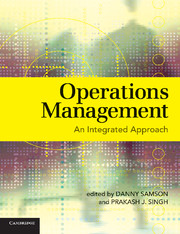Book contents
Preface
Published online by Cambridge University Press: 05 June 2012
Summary
We edited and wrote this book, using a large team of contributors from around Asia Pacific, with a focus on the ‘what’ and ‘how’ of operations management. The field has matured strongly in the past decade in Australia, New Zealand and other countries in the region. It now is fully seen in most industries and organisations as a key management function and as a challenging and interesting career stream for professional managers.
Put simply, operations management is concerned with most effectively designing, conducting and improving the organisation's production processes, whatever the sector or industry, and whatever the product or service. Operations management delivers the outcomes that are specified within the organisation's overall strategy, and according to the market needs that the organisation is responding to. At its best, effective operations management creates more than just a great response to the business strategy, in that it can do more than just deliver the business strategy with effective and competitive outcomes. It can create competitive advantages which themselves provide new potential business strategies and capabilities which can be further exploited when correctly aimed at a market.
The operations function is where the goods and services are made. Most of the organisation's assets and people are deployed in its operations. Operations is where the outcomes that are critical to the organisation's survival and prosperity are decided, namely cost and productivity outcomes, as well as quality, delivery performance, flexibility, innovativeness and others.
- Type
- Chapter
- Information
- Operations ManagementAn Integrated Approach, pp. xxi - xxiiiPublisher: Cambridge University PressPrint publication year: 2008



